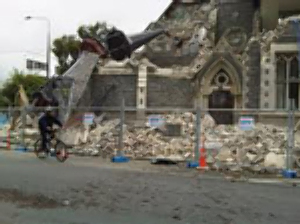
by Miriam Bell

The Property Council has urged the government to remove barriers facing building owners for assessing and upgrading their buildings against earthquakes
The Council’s chief executive Connal Townsend said there is a need for seismic assessments and earthquake upgrades of buildings – yet building owners face obstacles when doing so.
One of these could be tax as the IRD is currently looking to remove the tax deductibility of seismic assessments for buildings.
Townsend said property owners assess buildings for a number of reasons.
These included demonstrating seismic ratings to potential tenants or for insurance purposes where millions of dollars are at stake.
“But these reasons, and many others, to undertake assessments do not result in any capital expenditure, falling clearly within operating or maintenance costs.”
He said current tax rules already create a significant tax disadvantage for commercial, industrial, retail and heritage property owners.
“They worsen affordability issues when there is a need to upgrade. We do not want to make a bad situation even worse.
“Upgrading our tax rules and how they are interpreted so that seismic assessments are tax deductible is a first step to creating a more level playing field in how assets are treated.”
This is because it would align the tax treatment of buildings to that of almost all other New Zealand business assets, Townsend said.
“It is only fair for such costs to be considered deductible maintenance or operating expenditure for building owners.”
The Council wants a technical working group on the tax treatment of seismic related issues to be established.
EBSS (Evidence Based Seismic Strengthening) chairman Ian Harrison said the Council’s call was reasonable and rational.
“It’s a no-brainer really. Such assessments and upgrades are not capital expenditure. Rather they are an expense imposed by regulation.
“What is hard to figure out is why the IRD has decided to approach the issue in this way.”
Meanwhile, the Building Act (Earthquake-prone Buildings) Amendment Bill is currently before Parliament for its second reading.
Harrison said EBSS was extremely critical of the legislation as it stands.
But he commended ACT MP David Seymour’s two proposed supplementary order papers which aim to amend the Bill.
One of Seymour’s proposals is that all buildings in low seismic risk areas (like Auckland, Hamilton and Dunedin) should be exempt from the provisions of the legislation.
The other is that an exemption based on an earthquake life safety risk rating should be introduced.
Harrison said the proposals were an attempt to inject some rationality into seismic safety regulation with amendments that that are directed to the purposes of the Act – protecting lives, but not at any cost.
“We hope Parliament will give the amendments serious consideration.”
He added that EBSS will have an earthquake prone building test case before the Courts soon.
| « Commercial market growing | Optioning commercial alternatives » |
Special Offers
No comments yet
Sign In to add your comment

© Copyright 1997-2026 Tarawera Publishing Ltd. All Rights Reserved